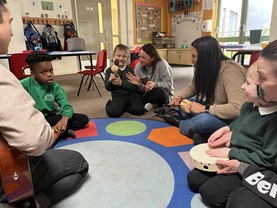
Schoolchildren in Mansfield have been reaping the benefits of a pioneering council scheme to bring more classical music into classrooms.
The three-year Musician in Residence scheme at Oak Tree Primary School has been running since 2023 thanks to Mansfield District Council funding as an Arts Council England backed National Portfolio Organisation.
A report into the effectiveness of the scheme in its first year has found that including more music in the curriculum has lead to improvements in pupils' concentration, behaviour, social interaction and created an excitement for learning.
The scheme has been delivered by Nottingham-based MishMash Productions, a music engagement specialist which has various projects running around the UK.
A MishMash musician, Erika Zeckser Owen, is embedded across the curriculum at Oak Tree Primary to enhance learning and engagement for 10 days per term. The school, which has a "Good" rating from OFSTED, is in one of the most deprived areas of the Mansfield District with 80% of the pupils on free school meals. The national average is about 25%. The scheme has helped all year groups but has been slightly more focussed on the younger pupils.
Recently, Erika worked alongside children with special educational needs and disabilities (SEND) which make up about 12% of the 211-pupil roll at Oak Tree Primary.
She said: “It is a privilege to work with the staff and children at Oak Tree, sharing my personal love of music and the arts with everyone.
“The children are so welcoming, it's a joy to experience the wonder of something new in their eyes during each visit. In addition, to the positive impact on children's learning, the staff and I are equally being impacted by this new creative and collaborative approach to lesson planning and delivery."
Kathryn Greenwood, Music Lead at Oak Tree, said: “The MishMash programme has provided our children with a wonderful opportunity to experience music in a variety of ways.
“After working with Erika, they have had the chance to see and hear the music up close and experienced the immediacy of a live performer changing the tempo, the pitch, even the mood of the music, right before their eyes!
“They have then responded to this music in a variety of ways in different lessons; as a stimulus for writing stories, counting rhythms in maths lessons and been able to investigate how the violin produces sounds in science lessons, as well as many other exciting activities.
“All of the children are able to access and be a part of these events and their learning is enhanced as a result.”
Looking ahead, Oak Tree Primary is seeking to establish music into the culture of the school, teaching and curriculum. Kathryn Greenwood concluded: “Erika is now a valued member of our school community and having music run through all areas of our curriculum is a significant benefit for all at Oak Tree.”
The Musician in Residence Scheme runs across four primary schools in England.
Liz Muge, CEO of MishMash Productions, said: “Our mission is to introduce and expose children and young people to live classical music via experiences where they feel welcome, and where they can enjoy and engage with the music.
“By doing this we aim to transform perceptions of what classical music could and should be, particularly for young people and family audiences.
“Our musicians collaborate with school staff to creatively enhance curriculum delivery, support wellbeing initiatives, increase student engagement, and contribute to staff development.
“In every school this project has run, there have been examples of children who are typically withdrawn or those who may exhibit challenging behaviours who have shown significantly improved engagement and behaviour.”
The project has been supported by Dr Peter J Woods, Assistant Professor, Learning Sciences, School of Education, University of Nottingham who has guided MishMash in evaluating the scheme.
A report by MishMash outlines the impact of the project and highlights its outcomes and benefits during its first year.
As well as better musical skills and knowledge, the pupils have also shown improvements in concentration, behaviour, confidence and self-esteem, social interaction, mood, aspiration and an excitement for learning. There is also evidence that the use of music has had the capacity to make acquired knowledge stick in a pupil’s memory.
The report says the feedback from both teachers and pupils has been overwhelmingly supportive of the scheme.
How the scheme has been used
The kind of activities they may instigate include:
- Using music to stimulate activities that improve pupils’ ability to read, write, listen and speak and to think critically and creatively.
- Demonstrating scientific principles through music.
- Using songs to aid rote learning.
- Creating musical aspiration through performances and jam sessions.
- Providing mindfulness and meditation sessions.
- Performances during breaks and lunchtime in the playground and dining hall and as parents and children are leaving at the end of the school day.
Teachers have used music to support storytelling and in English lessons where it has been used to create an atmosphere that enhances descriptive writing.
In science, instruments have been used in sound experiments and creative methods for recording findings, and it has been used in teaching the life cycles of butterflies and frogs and the water cycle.
Music has also been effectively used to enhance art, maths, geography and history lessons and in PE, acting as cues for specific movements and to guide movement and rhythm, integrating physical coordination with creative expression.
